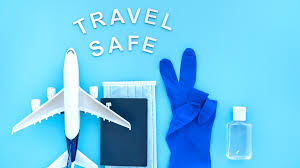Which is Best for Safe Travel – is one of life’s greatest adventures, offering opportunities for exploration, relaxation, and cultural immersion. However, ensuring your safety during your journey is paramount to enjoying a truly memorable experience. With various transportation options, accommodation choices, and destinations to consider, it’s essential to understand which measures are best for ensuring safe travel.
Choosing the Right Mode of Transportation
When embarking on a journey, the mode of transportation you select can significantly impact your safety. Whether you’re flying, taking a train, or driving, each option comes with its own set of safety considerations. Air travel, for instance, is statistically one of the safest modes of transportation, thanks to stringent regulations and advanced safety features onboard modern aircraft. Trains also offer a relatively safe means of travel, with designated safety protocols in place. On the other hand, driving provides flexibility but requires adherence to traffic laws and vehicle maintenance for optimal safety.

Researching Destinations
Before setting off to explore a new destination, conducting thorough research is crucial for ensuring a safe and enjoyable trip. Checking travel advisories issued by government agencies can provide valuable insights into potential risks or security concerns in specific regions. Additionally, familiarizing yourself with local laws, customs, and cultural norms can help you navigate unfamiliar surroundings with confidence and respect.
Accommodation Safety
Where you choose to stay during your travels can significantly impact your overall safety. Opting for reputable hotels or hostels with stringent security measures can provide peace of mind during your stay. It’s essential to inquire about safety features such as secure entry systems, well-lit premises, and emergency procedures to ensure a secure lodging experience.
Health and Medical Precautions
Maintaining good health while traveling involves more than just packing sunscreen and bug spray. Depending on your destination, you may need to obtain vaccinations or take other preventive measures to protect against local diseases. Carrying a basic first aid kit and essential medications can also prove invaluable in addressing minor health issues while on the road.
Personal Safety Tips
Regardless of where you travel, taking precautions to safeguard yourself and your belongings is essential. This includes securing your valuables, such as passports and electronic devices, in theft-proof bags or safes. Additionally, avoiding high-crime areas and being vigilant of your surroundings can reduce the risk of encountering dangerous situations.
Emergency Preparedness
No one likes to think about emergencies while on vacation, but being prepared can make all the difference in a crisis. Make sure to have a list of emergency contacts, including local authorities and embassy numbers, readily available. Familiarize yourself with evacuation routes and emergency procedures at your accommodations to ensure a swift and coordinated response if needed.
Technology and Safety
In today’s digital age, technology can be a valuable tool for enhancing travel safety. Utilizing travel apps that provide real-time updates on weather, traffic, and security alerts can help you stay informed and make informed decisions while on the go. Consider investing in GPS tracking devices or communication tools that enable you to stay connected with loved ones and emergency services, even in remote locations.
Financial Safety
Protecting your finances while traveling involves more than just safeguarding your wallet. Using secure payment methods, such as credit cards with fraud protection, can minimize the risk of financial loss due to theft or fraud. Additionally, carrying a mix of cash and cards in separate locations can provide a backup in case of emergencies.
Cultural Sensitivity
Respecting the customs and traditions of the places you visit is not only courteous but also essential for your safety. Avoid behaviors or attire that may be considered offensive or inappropriate in local culture, and always seek to interact with locals in a respectful and understanding manner.
Environmental Awareness
Being mindful of the environment is another aspect of safe travel that is often overlooked. Whether hiking through national parks or exploring urban landscapes, taking steps to minimize your impact on the environment can contribute to a safer and more sustainable travel experience for future generations.
Solo vs. Group Travel
The choice between traveling alone or with companions can have implications for safety. While solo travel offers freedom and independence, it also requires heightened awareness and self-reliance. Traveling with a group can provide a sense of security and camaraderie, but it’s essential to choose travel companions wisely and communicate openly about safety concerns and expectations.
Communication and Language Barriers
Navigating language barriers is a common challenge for travelers, but it needn’t be a barrier to safety. Investing in language learning resources or using translation apps can help bridge communication gaps and facilitate meaningful interactions with locals. Additionally, learning basic phrases in the local language, such as “help” or “emergency,” can be invaluable in times of need.
Staying Informed During Travel
Finally, staying informed and adaptable during your travels is key to ensuring your safety. Keep abreast of local news and developments, particularly regarding weather conditions, political unrest, or public health concerns. Flexibility and preparedness are essential attributes for any traveler, enabling you to respond effectively to unexpected situations as they arise.
Conclusion
In conclusion, prioritizing safety while traveling is essential for enjoying a smooth and memorable journey. By carefully considering factors such as transportation, accommodation, health precautions, and cultural awareness, you can minimize risks and maximize enjoyment during your travels. Remember to stay informed, remain vigilant, and embrace the adventure with an open mind and a cautious heart.
FAQs
- Is it safer to travel alone or with a group?
- Both solo and group travel have their advantages and risks. It ultimately depends on personal preferences and comfort levels.
- What should I do in case of a medical emergency abroad?
- Contact local emergency services immediately and seek assistance from your embassy or consulate for further guidance and support.
- How can I protect my belongings from theft while traveling?
- Invest in theft-proof bags or pouches, and avoid displaying valuable items in public. Utilize hotel safes or secure storage options when available.
- Are there any specific safety precautions for traveling to high-risk destinations?
- Research travel advisories and consult with local experts or tour operators for guidance on safety measures and potential risks.
- What should I do if I encounter a natural disaster while traveling?
- Follow local authorities’ instructions and evacuate to a safe location if necessary. Stay informed through official channels and communicate your status with loved ones.

